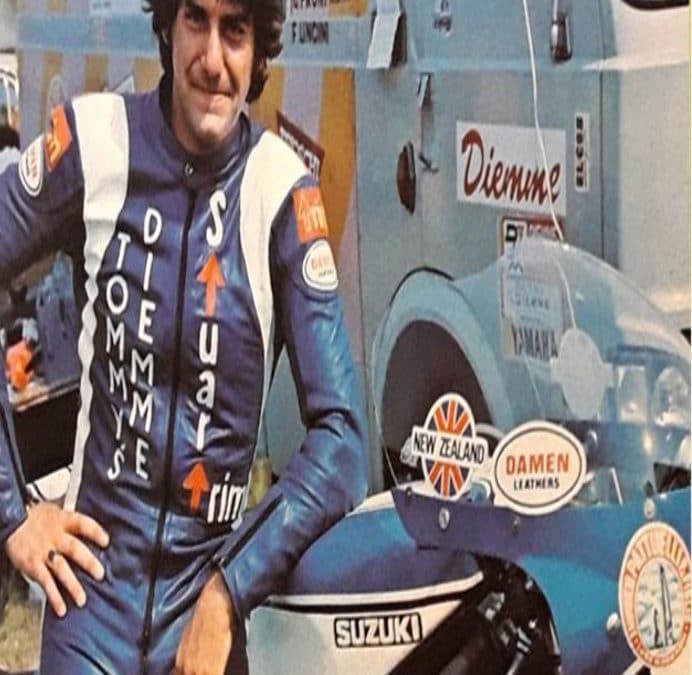Canterbury has always been a hot bed of motorcycle road racing talent for many decades. Never was this truer than in 1970s. Names like Boote, Wylie, Sinclair, and Galbraith just to name a few.
Stu Avant was be one of several top riders to come out of Christchurch, whether racing at Ruapuna raceway or around the port hills. Avant would win several New Zealand road race championships and titles on Suzuki and Yamaha machines in his race career.
Always up for a bit of fun, he was often center of attention, whether it was wheeling down the front straight of Ruapuna on a Yamaha TZ350, or making mischief around the pits.
Racing success in New Zealand wasn’t enough. He wanted more .The twenty-year-old Avant decided to head to Europe in 1976. But before that, he would stop over in Australia. The Australian TT was being run at an abandoned airbase in Victoria called Laverton, the promoter bought out several European teams including the MV Agusta team including Giacomo Agostini . Australia’s top riders and several top New Zealanders were invited. Stu lead the race until four laps from the end when his Suzuki seized. It wasn’t to be a complete disaster; he was introduced to several European teams. It wasn’t long before he received a confirmation he had a place in an Italian team. Asking old mate Mike Sinclair, who was living in Melbourne, whether he wanted to come to Europe to be his mechanic, Lucky for Stu he said yes.
Arriving in Europe in T-Shirts the two intrepid, Kiwi’s had forgotten that it wasn’t summer in Europe.
His first season got off to a good start seventh in the French Grand Prix, fifth in Austria and Sweden. Then a bad accident in Finland left him with Internal Injuries. He would recover, living with eight time World Champion Phil Read.
The life of a privateer was an adventure at best in the 1970s, in this era of racing everything was dictated by promoters, where riders had to negotiate start money, and hope they could get a start and good start money and do well and pick up prize money to get to the next round or at least purchase a new tyre. It was a life style of survival and commitment such as finding fifteen new ways to cook mince, scamming around for secondhand tyres and spare parts. International meetings paid more than Grand Prix but the Grand Prix had the prestige.
Long before cellphones and Internet, letters, telegrams and the occasional phone call were the only communication. They were expensive, so when a chance came to call home it was taken.
It was on one occasion in Belgium, the FIM jury room was unattended after the Grand Prix, and it had a fridge full of beer and four telephones. All the Kiwi and
Australian and South African riders spent the night phoning home around the world while emptying the fridge. The riders did not do such things to be smart; it was survival, saving a bit of money so that they could just survive to the next race.
Stu would come home every year for the Marlboro International series. The last year of the series riding an RG500 Suzuki for the same Italian team he had started out in Europe with.
Returning to Australia and Europe to continue as a privateer getting good results and earning a small living over the next few years. Stu was never a factory rider, but he was a realist. As he says He was never a must have, just a could have.
He also helped many Australian and New Zealand riders when they came over to Europe. Providing accommodation and workshop space, introducing them to track promoters and track owners among other things. His contacts were invaluable to many riders.
He continued to race in to the early 1980s in Europe, Australia and New Zealand.
In 1982, he became the first International rider ever to win the Northwest 200 in Northern Ireland ahead of Joey Dunlop and Mick Grant.
He became Suzuki GB’s test rider developing the honeycomb framed Suzuki 500 and finally retiring in 1985. He retired to live in Australia and run his own tyre business in Sydney. In 1997 he finally joined a factory team, when he joined the Lucky Strike Suzuki team as a rider liaison.
He continues to have interest in the sport and is associated with the Tom Dermody Classic Grand Prix machines that are ridden and shown all over Australia and New Zealand.
A life of a privateer and another worthy inductee in to the MNZ Hall of Fame.
Major Achievements
17 New Zealand Road Race Championships and titles
1st 1980 F1 International Donington Park UK
1st 1982 Northwest 200 Northern Ireland
1st 1978 500cc Australian Championship
1st 1978 500cc Australian Senior GP Bathurst
1st 1977 500cc Race McArthur Park Australia
2nd 1977 Belgium Superbike International
3rd 1977 Tilburg Road races Holland
5th 1976 Austrian Grand Prix and Swedish Grand Prix
and many more top ten finishes from All over Europe, Australia and New Zealand.
Written for the MNZ Hall of Fame by Ian Dawson 2021.
